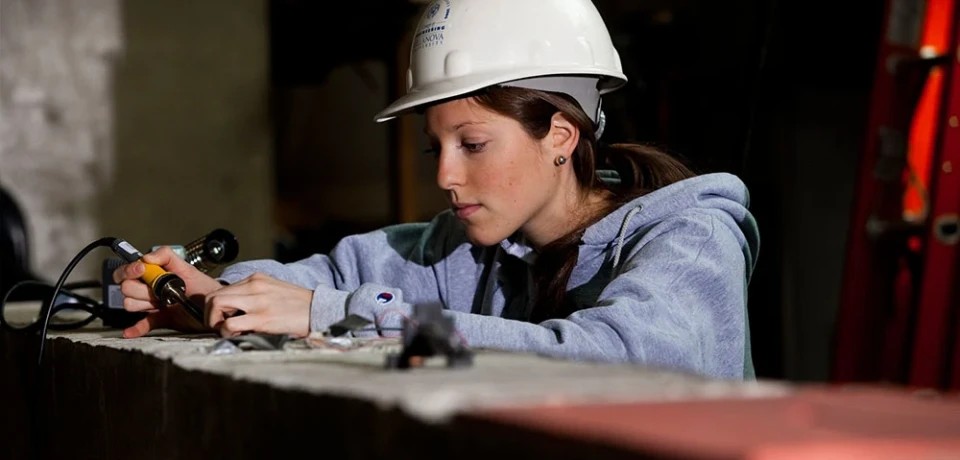Free UK Shipping over £100
Fast Shipping
Worldwide Shipping
Technical Sales Team

We have recently posted a couple of articles on Gender Equality/Women in Engineering.
This subject seems to be a hot topic at the moment so we asked @NickyDanino, a Senior Lecturer at the UCLan's School of Computing Engineering and Physical Sciences, her opinion on the subject.
Here's what she had to say:
A. I'm a Senior Lecturer at the University of Central Lancashire. I work in the School of Computing, Engineering and Physical Sciences. I love my job because every day is different. I teach classes both to undergraduate and post-graduate students. I do research. I get involved in outreach activities. I also develop and foster relationships with industry.
The students and staff are great and I am lucky in that I have a lot of autonomy to do things that interest me. Of course, this means that I end up working more hours than I should, but the line between my job and my hobbies is a very grey one nowadays.
A. Since a young age, I've always been interested in learning more about how things work. I've got very fond memories of spending hours and hours playing with Lego. I'd arrive home on a Friday after school and start setting my Lego town up until my mum made me put it all away on Sunday night.
As I got older I started to become interested in computers, after being introduced to them at school. We had one machine per year group, and if you finished your work early you were allowed to go on it. I nearly always finished first just because I didn't want to miss out on computer time. I still actually own my first machine, which I received for my 12th birthday after lots and lots of pleading on my behalf, a ZX Spectrum 48k, rubber keys and all.
However, I didn't consider that software engineering was something to study at University, so I initially went to do a degree in literature. That changed when I arrived at University and was introduced to the computer network and the variety of systems available. I quickly explored the changing course and have not looked back since.
A. I think things have changed somewhat over the years. I don't feel disadvantaged by my gender, though I do feel in the minority (and I am working on that). People are still surprised when I tell them that I work in science. I guess sometimes, subconsciously, we have a determined view of how someone who works in science looks like, and they don't look like me.
I'm very lucky though that UCLan is a very proactive and modern working environment, and I have never felt that being female is holding me back. If you have the drive, skills and qualifications, you have as much chance as anyone else to succeed, male or female.
A. It is a concern, but the solution is to do something positive with the data the survey has revealed, and not dwell on the negative. I work as a STEM ambassador, which means I can speak with children and show them an alternative to the usual computer geek or student. Let's face it, this puts girls off.
I show them that I have other interests, other parts of my life and work that are outside the traditional geek role. That's the main function I think I play.
To dispel the idea that they have in their heads and show them a new reality. I make a point of addressing both genders, rather than try and differentiate between them. It's all about trying to match up the child with something they are good at, they like, and are passionate about.
A. I think that as women grow up, they have an image of what an engineer is, an impression that is hard to shake and dispel. They have spent years believing in the image of engineering or computing and that is hard to shift. All we can do is show them what it actually is and give them a taste of the elements they might enjoy.
The number of females in the industry may be low, but they are a start that could potentially snowball into something more significant.
A. I think positive female role models are vital if we are going to remove the stereotypes that we have all been used to for so long. It's about changing the perception of who these girls think becomes an engineer or a mathematician or a scientist. Showing them success stories from university and the workplace is the start, but more needs to be done to celebrate these women and to show the younger girls that it is something they can do.
Getting women who work in the industry to engage with children in schools, and with the community at large, is important. And we should most definitely not be targeting just girls, but also boys, so that they grow up with the mindset that their sisters, girlfriends, mothers are all just as capable of being engineers as they are.
Working in engineering can be a challenging, exciting and rewarding job. Females need to consider it as a career choice early on in life, in order to take advantage of the opportunities available. There are girls at university studying engineering that can be successful, and most importantly, they will form part of the necessary process of redrawing the boundaries and changing the reality that has existed for so many years.
You can find out more about Nicky at NickyDanino.com and you can follow her at
Contact our technical sales advisors here.
Our team of engineers are fully equipped to provide bespoke system design and manufacture.
This process involves specifying, procuring, calibrating and maintaining instrumentation and control systems for industrial and commercial process control applications.
Call our technical sales team for advice

This site uses cookies to monitor site performance and provide a more responsive and personalised experience. You must agree to our use of certain cookies. For more information on how we use and manage cookies, please read our Privacy Policy.